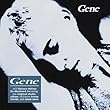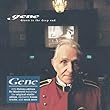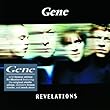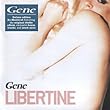
GENE, 1994-2004 Reissues

Can it really be 20 years already? 20 years since Gene rose to promenence, with “For The Dead”, and 10 since they quietly disappeared, mourned by a handful, and forgotten by many? At one point they could have been kings. Now, overlooked and ignored by Megador Records, the band have quietly faded from view to day jobs and memories. In time, the bands work – an elegant body that combined the majesty of The Smiths with the muscular strength of The Faces and 60's era Mod bands, has aged with dignity and power. Over four albums, and catch all b-sides compilation “To See The Lights”, the band explored humanity with increasing effectiveness and skill. This reissue series finally gives the band the dignity they deserve, with expanded editions of each record, appended with every b-side, an enormity of radio sessions (almost every single one the band recorded for the BBC,), and several live shows from the period, showcasing embryonic and early versions of many songs from subsequent albums – are a fascinating insight. In terms of unreleased material, there is little until the time the band were released from their Polydor contract, at which point the band had control of their own recordings. Each of the editions is packed in a double CD set, with the original album appended by b-sides and extra songs. Disc 2 of each package generally tends to be a live radio session recorded for the BBC and live material.
“Olympian”, the first album, was a confident 11 track missive, which didn't sound like a band tentatively making its debut, but more an assured statement from a band that had been doing this for years. (To an extent, they had, working together in various forms in other bands such as the dreadfully named Sp!n, before becoming the final Gene lineup). As such, it's a record where some of the bands best songs of the time - “For The Dead”, “Be My Light, Be My Guide”, “I Can't Help Myself”, weren't even on it ; favouring new material rather than old singles. Then again most bands would be overjoyed to have an album with three songs as good as “Sleep Well Tonight”, “Olympian” and “Haunted By You,” The album is appended by two single-only recordings, and several BBC Sessions, The second disc 2 offers two live BBC broadcasts (from Bristol and London), offering about 20 songs in total. Sure, since the band didn't have 20 songs at the time, there is a lot of repetition, - the title track appears four times (I think), but thats not to say this isn't anything other than a bountiful set of treasures.

Second album “To See The Lights” is really no such thing, but an huge grab bag of all the band's a- and b-sides for the first five singles, appended with bonus live songs, and a handful of radio session recordings. Yes. It is, utterly, “Hatful Of Hollow Part Deux”, and never anywhere was the bands Smiths influence writ more obviously. Since most of the live material on this album was taken from the London show which appears in full on the second disc of “Olympian”, it perhaps could be asked why the songs are repeated? On the other hand, having seen bands mess with the running order of albums for reissues, it's perhaps better not to muck with the known history. As a result, “To See The Lights” is a very good b-sides record, spoilt by untimely screeching from Londoners and live songs, as well as an incongrously placed cover of “Say A Little Prayer”. The second CD contains 4 songs from a BBC Radio Session in December 1995 – all of which were 18 months from release on 'Drawn To The Deep End' – and a live concert from the Phoenix Festival, which alongside several other songs that were yet to come out, also include a unexpected cover of Queen's “You're My Best Friend.” : the 'new' songs on the set are embryonic versions that would later become definitive on the subsequent album, but it is fascinating to hear the differing arrangements, the unusual lyrical variations, the way the band move around the basic form of the song and land in different places. In practical terms, this is an unexpected treat, with several early variants of well known songs. Perhaps more suited to the next album, but then again, with such a well documented career these versions are practically early demos that happened to be broadcast on the radio. Sadly, like the rest of the Megalabel years, the bands vaults are bare, exploited by a myriad of multiformatted singles – after all, the 8th b-side on the fourth single would not be, to be honest, crafted with the same care as the lead single, but more probably, written/recorded/mixed and finished in a few hours.

“Drawn To The Deep End”, the bands second album 'proper', was the masterwork : at the time, despite costing £300,000 and selling half a million copies worldwide, the label saw it as a failure. (For heavens sake, those kind of sales were significant at the time, and few bands play the Albert Hall without some promise, or appeal). The first side – made of four beautiful singles that explore loss, love, life, and meaning in a gentle but powerful frame – is one of the most powerful opening salvos of any record ever made. As it stands, the tide turned with the enormous failure that was “Be Here Now”, which sank (in one indulgent 70 minute slab) every hope and dream of their peers and killed the band, and many of their contemporaries, overnight. It was no longer enough to sell well. You had to sell ridiculous. It was no longer enough to be a great band. You had to sell great numbers of units in supermarkets. This was the modern world, where selling half a million records was a failure. Which made Gene in last chance saloon, despite having crafted one of the finest records of the decade. Rossiter stepped out into his own with a unique and articulate style, the band themselves, no longer in the shadows of their influences, became masters of light and shade, power and restraint, unafraid of silence. The triple hit of “Where Are They Now?”, “Speak To Me Someone” and “We Could Be Kings” was worth more in 12 minutes than the final 12 years of Oasis lifespan. That, and “Speak To Me Someone” is the kind of timeless and powerful song that will, inevitably, be discovered for some rubbish X-Factor muse's Uberballad in a few years time. After this, the record is beefed out on disc 1 with 8 non-album songs. Disc 2 is made of 8 songs live from the band's live peak, one night at the Albert Hall, and 6 BBC Session songs of the era that give a flavour of the material both before, and after, release.

“Revelations”, released in 1999 after the Britpop ship had sunk and the icebergs melted, was the sound of defiant beauty. It is perhaps a song or two too long, but it is also the sound of a band on the ropes, punching their way to glory with defiant arrogance, and a knowledge that sits deep in the grooves that they, even if the bands commercial stature was waning and the label was made of cloth eared nincompoops trying to get Limp Bizkit on the cover of “Select”, they were a band that had a magic in a world that wouldn't listen. Singles “As Good As It Gets” and “Fill Her Up” underperformed, but closing track “You'll Never Walk Again” was their finest moment to date, and ushered in the accompanying tour with no small power. Other songs on the album - “In Love With Love”, “The British Disease”, “Love Won't Work” - were equally powerful, articulate cries against the world that perhaps was made for other people, people rich or privileged, or in some way able to feel and walk through life as if it were just simple and easy and things just happened without having to fight every step of every day.
The record is bookended by several b-sides, some of which are truly forgettable, a BBC session, and a live set recorded in Newcastle a year before the albums release that saw more embryonic interpretations of song before they were finalised, which are fascinating. As ever, Rossiters stagecraft is articulately witty and enjoyable on its own, let alone with the marvellous songs. Fill Her Up, indeed.

Final record in the reissues is 2001's neglected “Libertine”, self-funded, confident but audibly smaller, the band moved to a more intimate lyrical plain, with songs such as “Does He Have A Name?”, “Is It Over”, and the frankly amazing “Somewhere In The World” being amongst the best by any band, ever, anywhere, laden down the lyrics as powerful as nuclear weapons, exploring jealously, love, loss, and being left behind with an accuracy only the once heart-broken will ever recognise. In terms of unreleased material, there is little until the time the band were released from their Polydor contract, at which point the band had control of their own recordings, and thus “Libertine” is awash with the b-sides of two singles, an extra handful of songs that the band included in foreign editions of the record, and numerous demos and unreleased songs. (Sadly, the rather unusual cover version of “Back For Good” is absent, but easily available elsewhere). Since two full live shows from the era were released on DVD, it is understandable that no live material is on this release, instead favouring a plethora of unreleased material, with around 13 demos and unreleased songs as well as 10 or so absent from the original record, including the final single, the wonderful, and graceful “Let Me Move On”, that proved that even with their dying breath, Gene had more wit in one verse than other bands had in their lifetime. Is it over?
To be honest, there's little more a fan could expect given the circumstances, and the limited commercial interest and profile this band currently has, and whilst it is a musical loss that Gene were not blessed with a 30 year journey similar to obvious contenders of sometimes lesser skill but wider appeal, this is as good as it gets.
<< Home

